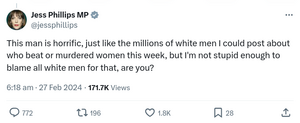Difference between revisions of "Weasel words"
| Line 5: | Line 5: | ||
Weasel words can harshen or over-state a controversial statement. An example of this is using terms like "somewhat" or "in most respects," which make a sentence more ambiguous than it would be without them.[1] |
Weasel words can harshen or over-state a controversial statement. An example of this is using terms like "somewhat" or "in most respects," which make a sentence more ambiguous than it would be without them.[1] |
||
| − | {{ |
+ | {{Featured}} |
{{Glossary}} |
{{Glossary}} |
||
{{Wikipedia}} |
{{Wikipedia}} |
||
Revision as of 10:31, 28 February 2024

Weasel words are words and phrases aimed at creating an impression that specific and meaningful statements have been said when in fact only vague, ambiguous, or irrelevant claims have been communicated. The term may be considered informal. Examples include the phrases "some people say", "it is thought", and "researchers believe". Using weasel words may allow one to later deny any specific meaning if the statement is challenged, because the statement was never specific in the first place. Weasel words can be a form of tergiversation and may be used in advertising, (popular) science, opinion pieces and political statements to mislead or disguise a biased view or unsubstantiated claim.
Weasel words can harshen or over-state a controversial statement. An example of this is using terms like "somewhat" or "in most respects," which make a sentence more ambiguous than it would be without them.[1]
This article contains information imported from the English Wikipedia. In most cases the page history will have details. If you need information on the importation and have difficulty obtaining it please contact the site administrators. Wikipedia shows a strong woke bias. Text copied over from Wikipedia can be corrected and improved.